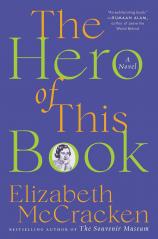The Hero of This Book
Review
The Hero of This Book
The unnamed narrator of Elizabeth McCracken’s THE HERO OF THIS BOOK goes to great pains to assure readers (and perhaps, by extension, herself) that what they hold in their hands is decidedly a novel and not a memoir: “Perhaps you fear writing a memoir, reasonably. Invent a single man and call your book a novel. The freedom one fictional man grants you is immeasurable.” Readers are likely to come to their own conclusions as to whether this book is a memoir, a work of fiction, or something intriguingly in between. But that uncertainty doesn’t diminish the pleasure involved in reading this slim volume about writing, family and grief.
"Novel or memoir? At the end of the day, this distinction is the least important part of this beautiful, timeless book about the heroes we lose and what still remains."
The book’s narrator is a writer, despite the fact that “[w]riters are dull by themselves, intolerable when they gather. Intolerable always. I find myself intolerable, the author of these sentences, which means I am writing a book about a writer.” The narrator is returning to London for a trip during the summer of 2019, “the summer before the world stopped” and the summer after her mother’s death.
The book’s framing story follows the narrator on a day around London, from checking into her small hotel to visiting the London Eye, the Tate Modern, and attending a performance of “A Midsummer Night’s Dream.” The narrator experiences feelings that might seem familiar to others who have lost loved ones, as her mind constantly travels back to the last trip she took to the city with her mother. She is both haunted by memories of that trip and guided by her mother’s preferences as she decides what to see and do on this trip, alone. She even has lingering travel regrets --- realizing too late, for example, that the London Eye could have accommodated her mother’s mobility challenges, even though she previously had written off the attraction as impossible for someone in a walker to navigate.
The narrator’s mother’s cerebral palsy and associated ways of moving, combined with the narrator’s advice to her writing students --- “Don’t forget your characters’ physical selves” --- means that she spends a lot of the book considering her parents’ bodies and how they are tangled up in her memories. She writes about her father’s immense size and propensity to drink too much, along with her mother’s small feet, unruly hair, ability to fall without hurting herself, and acceptance that her small size and slower speed meant that she was always late.
She also writes with at times painful clarity about the realities of sifting through things after her parents have passed: cleaning their house (which had reached near-hoarder condition) before hosting an estate sale, attending that estate sale and seeing the remnants of their lives and her own childhood carted away by strangers, meeting with an advisor to ensure that everything is in order with their modest finances. Throughout the book, she questions what compels her to write about these things. She also wonders if her mother’s death has granted her a freedom of a sort, in enabling her to finally include her mother as a character (in fact, the titular hero) in a way that would have been impossible if her mother was still alive.
Novel or memoir? At the end of the day, this distinction is the least important part of this beautiful, timeless book about the heroes we lose and what still remains.
Reviewed by Norah Piehl on October 7, 2022
The Hero of This Book
- Publication Date: October 3, 2023
- Genres: Fiction, Women's Fiction
- Paperback: 192 pages
- Publisher: Ecco
- ISBN-10: 0062971298
- ISBN-13: 9780062971296










